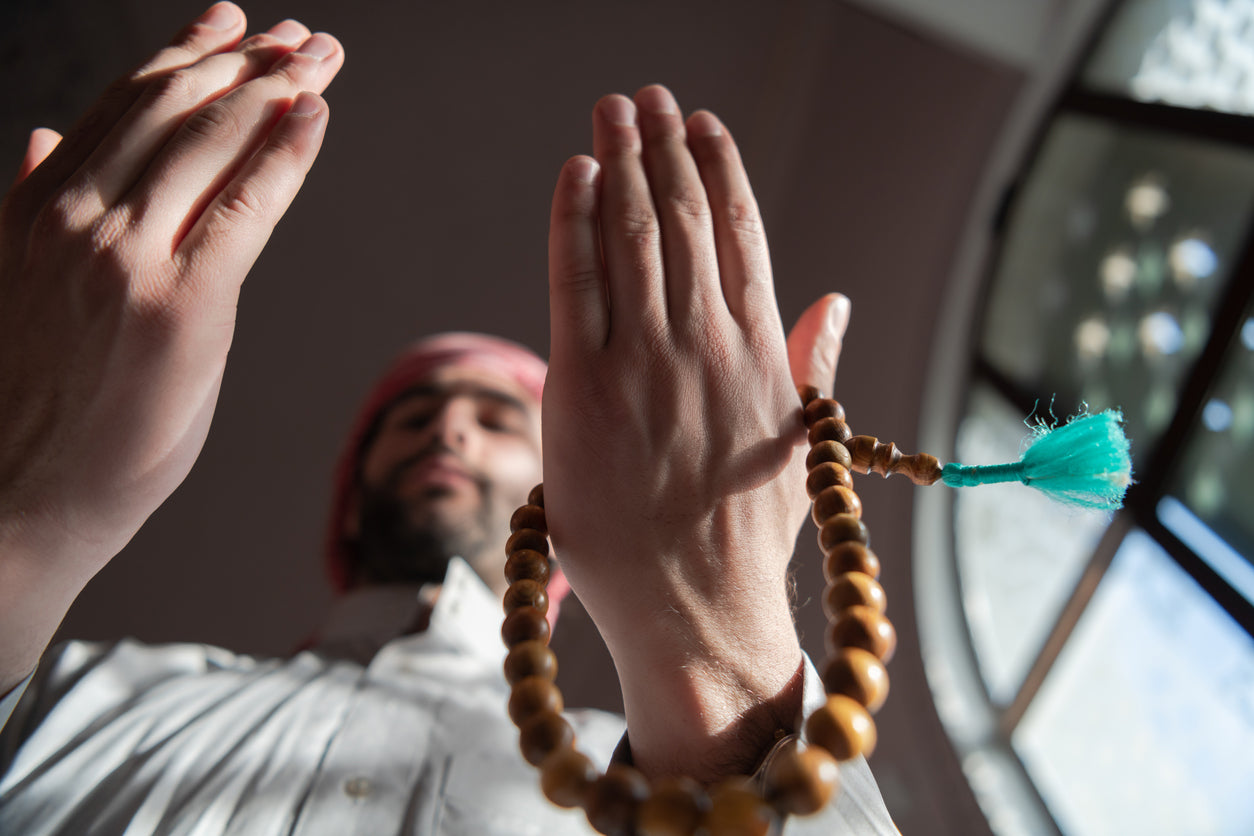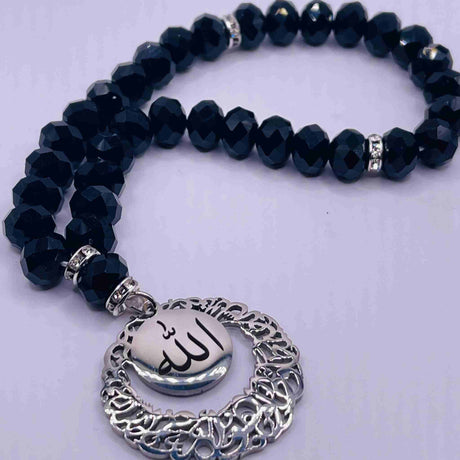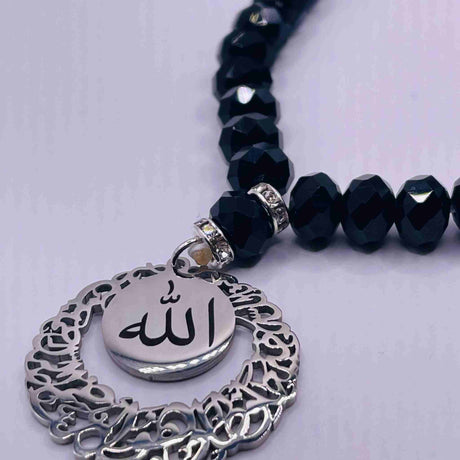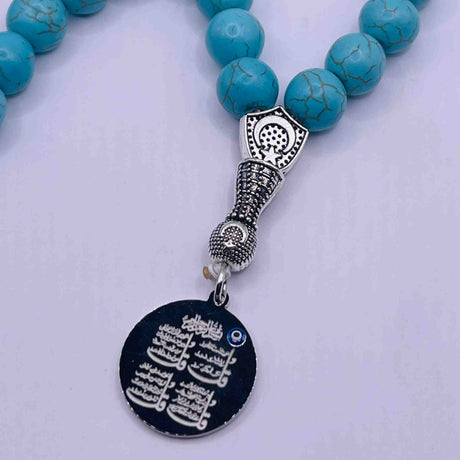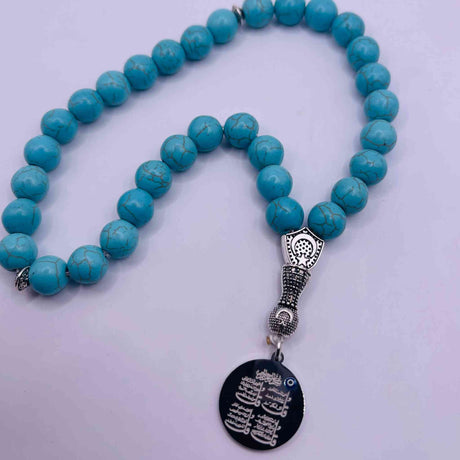Key Takeaways:
-
Quranic Dhikr: Incorporating verses from Surah Al-Baqarah (verses 163, 255, and 285) into your dhikr practice after prayer.
-
Affirming Tawheed: These verses emphasize the oneness of Allah (SWT) and the importance of worshipping Him alone, reinforcing the core principle of Islam.
-
Comprehensive Declaration of Faith: Verse 285 serves as a comprehensive declaration of faith, encompassing belief in Allah, His angels, His books, and all His messengers.
Next, Dhikr after salah continued with the recitation of Al-Baqarah Verse 163:
وَإِلَـٰهُكُمْ إِلَـٰهٌ وَاحِدٌ ۖ لَّا إِلَـٰهَ إِلَّا هُوَ الرَّحْمَـٰنُ الرَّحِيمُ
Wa ila hukum ilaahum’ wahidullaa ila ha illa huwarrahmanurrahim
Meanings:
And your god is one God. There is no deity [worthy of worship] except Him, the Entirely Merciful, the Especially Merciful.
Next, Dhikr continued with the recitation of Al-Baqarah verse 255:
اللَّهُ لَا إِلَٰهَ إِلَّا هُوَ الْحَيُّ الْقَيُّومُ ۚ لَا تَأْخُذُهُ سِنَةٌ وَلَا نَوْمٌ ۚ لَهُ مَا فِي السَّمَاوَاتِ وَمَا فِي الْأَرْضِ ۚ مَنْ ذَا الَّذِي يَشْفَعُ عِندَهُ إِلَّا بِإِذْنِهِ ۚ يَعْلَمُ مَا بَيْنَ أَيْدِيهِمْ وَمَا خَلْفَهُمْ ۖ وَلَا يُحِيطُونَ بِشَيْءٍ مِّنْ عِلْمِهِ إِلَّا بِمَا شَاءَ ۚ وَسِعَ كُرْسِيُّهُ السَّمَاوَاتِ وَالْأَرْضَ ۚ وَلَا يَئُودُهُ حِفْظُهُمَا ۚ وَهُوَ الْعَلِيُّ الْعَظِيمُ
Allaahu la ilaaha illa huwal hayyul Qayyum, la ta ‘khudzuhu sinatun walaa naumun lahu maa fissamaawaati wama fil ardhi, man dzal ladziiyasy fa ‘u ‘indahu illaa biidznih, ya ‘lamu maa baina aydiihim wa maa khalfahum, walaayuhiithuuna bisyai-in min’ilmihi illaa bimaa syaa-a, wasi’a kursiyuhus samaawaati wal ardhi, walaa yauuduhu hifzuhumaa wa huwal’aliyuul ‘azhiim.
Meanings:
Allah – there is no deity except Him, the Ever-Living, the Sustainer of [all] existence. Neither drowsiness overtakes Him nor sleep. To Him belongs whatever is in the heavens and whatever is on the earth. Who is it that can intercede with Him except by His permission? He knows what is [presently] before them and what will be after them, and they encompass not a thing of His knowledge except for what He wills. His Kursi extends over the heavens and the earth, and their preservation tires Him not. And He is the Most High, the Most Great.
Continued with the recitation of Al-Baqarah verse 285:
Here is the Arabic text you provided:
آمَنَ الرَّسُولُ بِمَا أُنزِلَ إِلَيْهِ مِن رَّبِّهِ وَالْمُؤْمِنُونَ ۚ كُلٌّ آمَنَ بِاللَّهِ وَمَلَائِكَتِهِ وَكُتُبِهِ وَرُسُلِهِ ۚ لَا نُفَرِّقُ بَيْنَ أَحَدٍ مِّن رُّسُلِهِ ۚ وَقَالُوا سَمِعْنَا وَأَطَعْنَا ۖ غُفْرَانَكَ رَبَّنَا وَإِلَيْكَ الْمَصِيرُ
Aamanar-rasulu bimaa unzila ‘ilaihi min robbih wal mu’minun kullun Aamana billahi wa mala ikatihi wakutubihi wa rusulih Laa nufarriqu baina ahadim-mirr-rusulih, wa qolu sami’na wa atoghna ghufronaka rabbana wa ilaikal masirr
Ayah 285, and is a declaration of faith by the Prophet Muhammad and the believers in Allah, His angels, His books, and His messengers. It emphasizes the unity of belief in all the prophets and their teachings and expresses obedience to Allah.
Read about the meanings of these verses and other Islamic practices through our comprehensive blog series.
Do more for your dhikr practice with our beautiful collection of prayer beads and other Islamic accessories.
Frequently Asked Questions:
Q: Why is Surah Al-Baqarah considered significant in Islam?
A: Surah Al-Baqarah is the longest chapter in the Quran and contains comprehensive guidance on various aspects of faith, law, and morality.
Q: What is the significance of Ayat-ul-Kursi (verse 255)?
A: Ayat-ul-Kursi is considered one of the most powerful verses in the Quran, emphasizing Allah's greatness, knowledge, and sovereignty over all creation.
Q: How can I incorporate these verses into my daily dhikr?
A: You can recite these verses after your prayers or at any other time throughout the day to remember Allah and reaffirm your faith.
Q: Why is it important to declare faith in all of Allah's prophets?
A: Belief in all prophets is a fundamental tenet of Islam, signifying that the message of monotheism and submission to God has been consistent throughout history.
Q: What are some other verses from the Quran that I can incorporate into my dhikr practice?
A: You can explore other verses that resonate with you and reflect your spiritual needs and goals.

